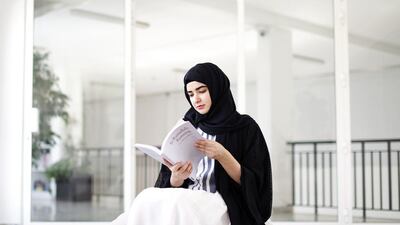The three men sit facing the camera in their basic dwelling. On the exposed brick wall behind them hang their simple belongings, which include a lantern and a washing pot. On the floor is a large dish and a flask, from which they share their meals.
They are part of a dwindling population of people who live and work in the Hajjar Mountains in Ras Al Khaimah.
The mountains, which interest geologists as they are made from igneous rock from the oceanic crust, have also captured the attention of Reem Falaknaz, an Emirati photographer.
Earlier this year, Falaknaz won a fellowship with New York University Abu Dhabi for the first batch of their Forming Intersections and Dialogues or FIND research programme, with a proposal to document mountain life in the UAE.
Her project, The Place of Perpetual Undulation, was initially aimed at covering the whole country but she soon realised there was so much to discover that she narrowed down her findings for the three-month period to Ras Al Khaimah only.
This month however, she has been accepted as one of nine fellows on the Arab Documentary Photography Program, part of the annual programme of the Beirut-based Arab Fund for Arts and Culture (AFAC).
As part of this fellowship, the project has been funded for a further eight months so that Falaknaz can achieve her goal of expanding her photographic research from Ras Al Khaimah into Fujairah, Sharjah’s east coast and maybe even into Oman.
“Documenting mountain life has been done all over the world but not here in the UAE and what I have done so far is just the start,” she says. “I feel happy that I am getting a chance to explore this life that is disappearing and there is so much more for me to do.”
The images that she has taken so far were shown in an exhibition running parallel with the Emirates Photography Competition that opened in May on Saadiyat Island. Curated by the established photographer Tarek Al Ghoussein, it was the first hint for Falaknaz that her work will be of considerable importance to her and for future generations.
“Everything is transitory and momentary and I feel blessed to be able to continue this work and that people are opening up to me,” she says.
Falaknaz has been documenting the contemporary history of the UAE since she began practising photography. At Art Dubai last year, she completed a three-month residency in the Al Fahidi Historical Neighbourhood exploring the daily lives of the people who work in the Dubai ports and presented it at the art fair by exhibiting some of their most personal items, which her subjects had given to her as part of her research.
Her decision to pursue the mountain life came through her former job at a television station in Dubai. “I saw producers continually covering the same stories about the UAE such as pearl diving,” she says, “and while it is good that people are doing that, I believe there is room for much more.”
Being accepted to the AFAC programme is an important confirmation of these beliefs. The Arab Documentary Photography Program aims to support, financially and professionally, documentary photography projects that shed light on unknown narratives by supporting artists who are engaged and sensitive to their surroundings.
This is the perfect fit for that project, as many people in the UAE know nothing about these pockets of culture.
With the help of her fellow photographer Saleh Al Shehi, who is also interested in the mountains and agreed to act as her guide, Falaknaz discovered many subjects for her work.
“I found older people who grew up there and then left but had returned. I found a few who had always been there. I also found many people who visit on the weekends, as well as workers who were digging away at the mountains. The photos I have so far only tell a small part of the story. I hope that by next year, I will have many more.”
aseaman@thenational.ae

